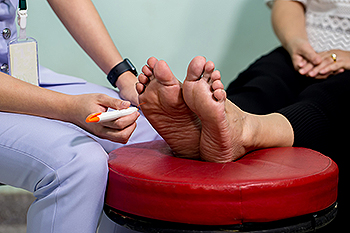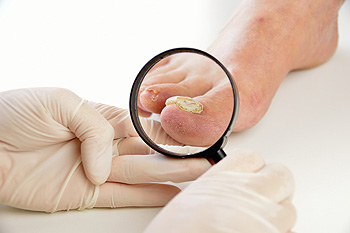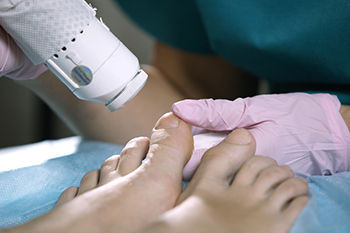Items filtered by date: December 2021
Are Bunions Affecting Your Everyday Life?
Ways to Reduce Foot Problems for Diabetics
Most people associate diabetes with blood sugar and insulin levels, but many diabetics are also at risk for severe foot problems. Over time diabetes may cause nerve damage and this is commonly referred to as diabetic neuropathy. This condition can cause numbness, tingling, and pain in the feet. Once this develops you might not notice a cut or sore on the foot which could lead to an infection. Diabetes can also reduce blood flow to the feet making it even more difficult for a cut or infection to heal. Without treatment an infection may lead to gangrene, and in severe cases amputation of a toe or foot could be necessary. If you have diabetes there are ways to keep your feet healthy: inspect your feet every day for cuts, sores, scrapes, or any other changes; wash and dry your feet thoroughly; trim toenails straight across and not too short; wear socks and shoes that fit correctly; and elevate your feet while you are sitting. If you have foot wounds that won't heal, notice an odor coming from your feet, or see changes to the color or shape of your feet, it is strongly suggested that you seek the care of a podiatrist as soon as possible.
Diabetic foot care is important in preventing foot ailments such as ulcers. If you are suffering from diabetes or have any other concerns about your feet, contact one our our podiatrists from Newtown Comprehensive Foot Care. Our doctors can provide the care you need to keep you pain-free and on your feet.
Diabetic Foot Care
Diabetes affects millions of people every year. The condition can damage blood vessels in many parts of the body, especially the feet. Because of this, taking care of your feet is essential if you have diabetes, and having a podiatrist help monitor your foot health is highly recommended.
The Importance of Caring for Your Feet
- Routinely inspect your feet for bruises or sores.
- Wear socks that fit your feet comfortably.
- Wear comfortable shoes that provide adequate support.
Patients with diabetes should have their doctor monitor their blood levels, as blood sugar levels play such a huge role in diabetic care. Monitoring these levels on a regular basis is highly advised.
It is always best to inform your healthcare professional of any concerns you may have regarding your feet, especially for diabetic patients. Early treatment and routine foot examinations are keys to maintaining proper health, especially because severe complications can arise if proper treatment is not applied.
If you have any questions please feel free to contact our office located in Newtown, CT . We offer the newest diagnostic and treatment technologies for all your foot and ankle needs.
Am I at Risk of Developing Fungal Toenails?
Fungi that reside on the body can become overgrown over time in, or on, the toenail. This can result in an infection known as onychomycosis. You can also pick up the infection through contact with someone who has it. Further, this fungal infection can be transmitted through contact with toenail clippers, nail files or pedicure instruments at a salon where fungi are present. Older adults — whose drier nails make it easier for fungi to enter the nail — are more prone to developing fungal infections, as well as those who wear fake nails, use public swimming/showering areas, have diabetes, poor circulation, a nail injury, or a weakened immune system. People whose feet are confined to warm, moist environments where fungi thrive (i.e., dark boots or sneakers) are also more at risk of developing fungal nails. Fungal nail symptoms include brittle, thickened, discolored or distorted nails, which can sometimes be accompanied by odor or pain. While some people try to treat fungal toenail infections at home, the fungi are very stubborn and resilient. Professional treatment from a podiatrist is often necessary to quickly and completely eradicate the infection, and prevent it from recurring.
If left untreated, toenail fungus may spread to other toenails, skin, or even fingernails. If you suspect you have toenail fungus it is important to seek treatment right away. For more information about treatment, contact one our our podiatrists of Newtown Comprehensive Foot Care. Our doctors can provide the care you need to keep you pain-free and on your feet.
Symptoms
- Warped or oddly shaped nails
- Yellowish nails
- Loose/separated nail
- Buildup of bits and pieces of nail fragments under the nail
- Brittle, broken, thickened nail
Treatment
If self-care strategies and over-the-counter medications does not help your fungus, your podiatrist may give you a prescription drug instead. Even if you find relief from your toenail fungus symptoms, you may experience a repeat infection in the future.
Prevention
In order to prevent getting toenail fungus in the future, you should always make sure to wash your feet with soap and water. After washing, it is important to dry your feet thoroughly especially in between the toes. When trimming your toenails, be sure to trim straight across instead of in a rounded shape. It is crucial not to cover up discolored nails with nail polish because that will prevent your nail from being able to “breathe”.
In some cases, surgical procedure may be needed to remove the toenail fungus. Consult with your podiatrist about the best treatment options for your case of toenail fungus.
If you have any questions, please feel free to contact our office located in Newtown, CT . We offer the newest diagnostic and treatment technologies for all your foot care needs.
How MLS Laser Therapy Sheds Light on Pain and Inflammation
MLS (Multiwave Locked System) Laser Therapy is a non-invasive method of treatment that uses two continuous therapeutic wavelengths of light that penetrate deep into the tissue to stimulate the regeneration of cells, decrease pain and inflammation, and improve circulation to the injured area. While there may be a slight warming sensation at the site of treatment, the combination of these two synchronized wavelengths minimizes the risk of thermal damage. Treatments generally take 10-15 minutes, and the typical course of treatment entails roughly 6 to 12 treatments. Many patients experience long-term positive results from MLS Therapy, as it addresses the cause of pain rather than simply masking symptoms. Podiatrists may use MLS therapy to treat plantar fasciitis, Achilles tendon issues, bursitis, neuromas, arthritis, fractures, injuries, and more. If you have any of these conditions, talk to your podiatrist to see if you are a good candidate for MLS Laser Therapy.
MLS Laser Therapy is a successful alternative for treating any pain you may be experiencing related to certain podiatric conditions. If you are interested in MLS Laser Therapy, consult with one our our podiatrists from Newtown Comprehensive Foot Care. Our doctors will assess your condition and provide you with quality foot and ankle treatment.
MLS Laser Therapy
Multiwave Locked System (MLS) Laser Therapy is a patented, FDA-cleared technology that helps relieve pain and inflammation from a number of podiatric conditions, including:
- Heel Pain
- Plantar Fasciitis
- Sports Injuries
- Wounds
- Achilles Tendonitis
- Arthritis
- Neuropathy
- Neuromas
MLS Laser Therapy is an ideal alternative to surgery and prescription medication, as it has no negative side effects and encourages accelerated healing. Among its many clinical benefits, MLS Laser Therapy also:
- Reduces swelling due to bruising or inflammation
- Blocks pain
- Reduces formation of scar tissue
- Improves nerve function
If you have any questions, please feel free to contact our office located in Newtown, CT . We offer the newest diagnostic and treatment technologies for all your foot care needs.
Preventing Sweaty Feet
 Plantar hyperhidrosis is a medical condition that can cause excessive sweating in the feet. This problem can not only be uncomfortable and embarrassing, but also a contributing factor to other foot problems, such as fungal infections of the skin and toenails. Plantar hyperhidrosis is best treated by a professional, however there are some steps that you can take to reduce foot sweating in your day to day life. These include wearing socks that wick moisture away from your feet, wearing shoes made of breathable materials, and maintaining good foot hygiene. Over-the-counter antiperspirants and antifungal powders can also be helpful. If you suffer from excessively sweaty feet, don’t hesitate to schedule an appointment with a podiatrist near you.
Plantar hyperhidrosis is a medical condition that can cause excessive sweating in the feet. This problem can not only be uncomfortable and embarrassing, but also a contributing factor to other foot problems, such as fungal infections of the skin and toenails. Plantar hyperhidrosis is best treated by a professional, however there are some steps that you can take to reduce foot sweating in your day to day life. These include wearing socks that wick moisture away from your feet, wearing shoes made of breathable materials, and maintaining good foot hygiene. Over-the-counter antiperspirants and antifungal powders can also be helpful. If you suffer from excessively sweaty feet, don’t hesitate to schedule an appointment with a podiatrist near you.
If you are suffering from hyperhidrosis contact one our our podiatrists of Newtown Comprehensive Foot Care. Our doctors can provide the care you need to attend to all of your foot and ankle needs.
Hyperhidrosis of the Feet
Hyperhidrosis is a rare disorder that can cause people to have excessive sweating of their feet. This can usually occur all on its own without rigorous activity involved. People who suffer from hyperhidrosis may also experience sweaty palms.
Although it is said that sweating is a healthy process meant to cool down the body temperature and to maintain a proper internal temperature, hyperhidrosis may prove to be a huge hindrance on a person’s everyday life.
Plantar hyperhidrosis is considered to be the main form of hyperhidrosis. Secondary hyperhidrosis can refer to sweating that occurs in areas other than the feet or hands and armpits. Often this may be a sign of it being related to another medical condition such as menopause, hyperthyroidism and even Parkinson’s disease.
In order to alleviate this condition, it is important to see your doctor so that they may prescribe the necessary medications so that you can begin to live a normal life again. If this is left untreated, it is said that it will persist throughout an individual’s life.
A last resort approach would be surgery, but it is best to speak with your doctor to find out what may be the best treatment for you.
If you have any questions please feel free to contact our office located in Newtown, CT . We offer the newest diagnostic and treatment technologies for all your foot and ankle needs.




